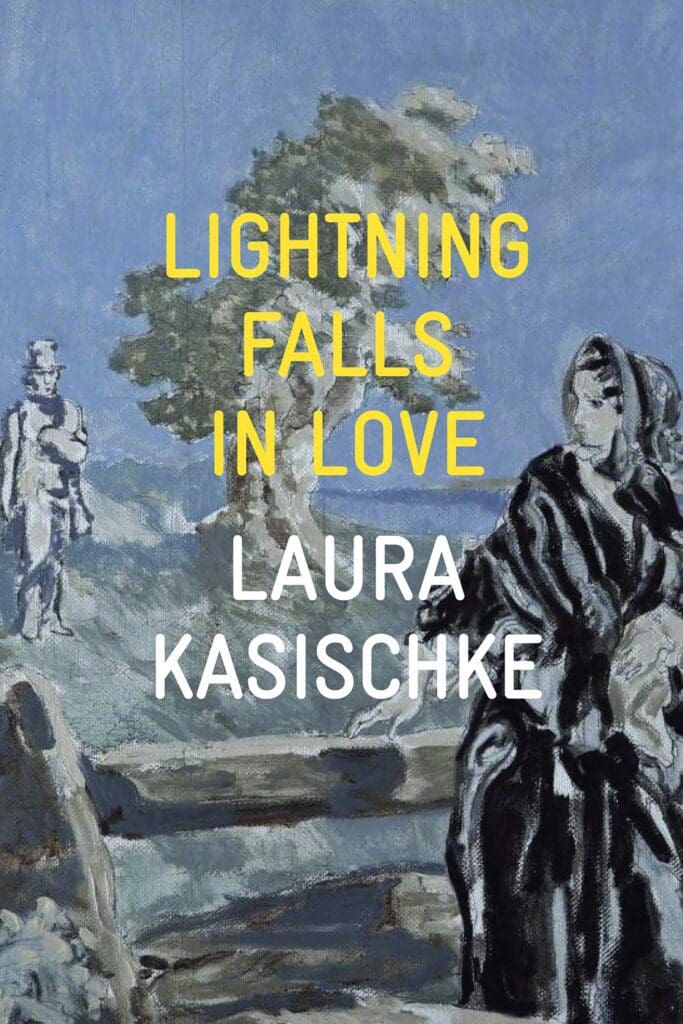Laura Kasischke’s latest poetry collection, Lightning Falls in Love (144 pages; Copper Canyon Press), is a charming address to time and the eternities sustained in memory. In fifty-two poems, Kasischke moves multilaterally over the many folds and features of memory, both personal and fantastic. “I was living my life a second time/for the first time/in my life,” she writes, “understanding/that I’d already lived a long time before I realized/that I was old enough by then to have been/my own daughter when my mother died.” What’s assembled in the collection is a swift mélange of the past, equal parts ordinary, death-bound, and divine.
Lightning Falls in Love is organized in four parts, named after the four variations of a nursery rhyme included at the opening of the book.
Ladybug, ladybug
Fly away home
Your house is on fire
Your children are gone…
The writing is sectioned into “(are gone),” “(have burned),” “(will burn),” and “(have flown),” following a tonal specificity appropriate of the collection: past-gazing, wry, interested in a subtle morosity. Like the poems themselves, the four sections render distinct simultaneities in time. Kasischke unveils a series of unending moments through the poems, each with its own temporal direction or momentum. In “Nostalgia for Infinity,” she writes:
We learned to live in silence then. Until
our mother asked him could she smoke a cigarette.
We didn’t hear his answer, but he must have said, “No,” since
we saw her put her fingertips to her lips instead
of a cigarette, and then she put the tips
of her red-painted nails
between her teeth, after which, one by one, we heard
nothing for several light-years except the sharp
trigger-snap, again and again, as she sat
beside him in our spaceship gnawing
her claw’s down
to their sharpest bits, and then
down to the quick, and then
down to the nostalgic
meat under it, while
we traveled on.
Kasischke deposits us here at the foot of a perpetuity, making an eternity of the smallest scale (nail biting). The poem’s close visualizes the general ambition of the writing, which gnaws at the “nostalgic meat” in memories of all kinds.
Pasts in Kasischke’s writing are diffuse and uncontained, and, in her words, “both lost forever now and all around me.” The eternities within them seem to flout, or even make friendly, the greater desolation of loss.
From “Red Mud Lake (2)”:
the lake in which the bones of corpses
dissolve into cattails to become
lily pads, tadpoles, one lost glove.
Many of Kasischke’s poems bring corrosion and death into an easy proximity to life (“lily pads, tadpoles…”) in ways that toy with and contest their distinction. Her swift bundling of these images leaves little room for grating or discomfort. Even divinity is glimpsed in the abject: In “The odyssey,” Kasischke writes of “lips…meeting/in a stillborn’s kiss.”
Kasischke’s ready coupling of the living and dead in memory speaks to her regard for time as both “dangerous” and celestial. A particularly arresting moment in her poem “The eavesdropper (or what I thought I heard mother talking about on the phone, in another room, 36 years ago)” animates this vision of time and how it so gracefully contours the collection. She writes:
after they’ve gone to bed I take it out and lie on my back in the grass and balance the jar on my chest and then together we watch the metallic flower petals spin into each other through that dangerous memory of heaven which is I suppose the past

